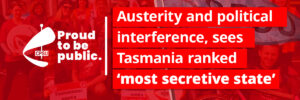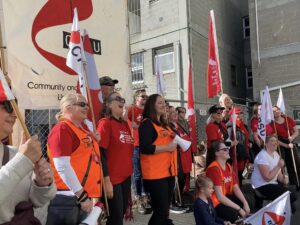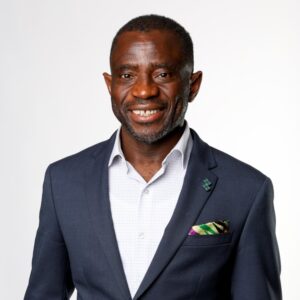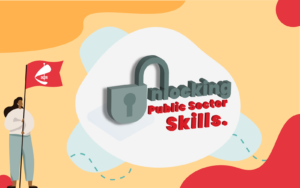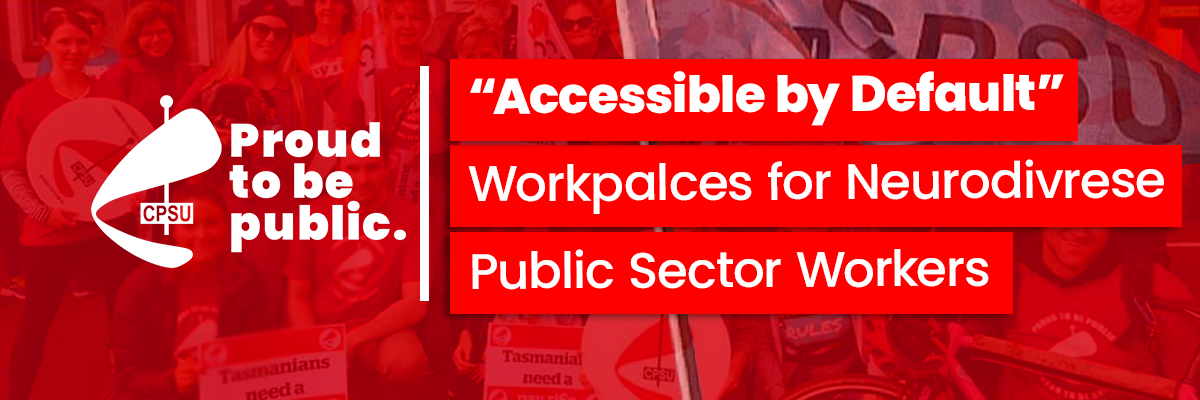
“Neurodiversity refers to the virtually infinite neuro-cognitive variability within Earth’s human population. It points to the fact that every human has a unique nervous system with a unique combination of abilities and needs.”
- Judy Singer (Australian sociologist, founder of the term ‘Neurodiversity’)
Jump to Section
- Opportunities and Potentials
- Flexibility & Mobility
- Hiring, Managing & Workplace Culture
- One Step Forward…
Neurodiversity has increasingly entered the conversation in our community, thanks to the tireless activism and awareness-raising of advocates and activists. In the space of just a few decades, it’s led to a revolution in teaching and public service delivery as we better understand the varied needs of those in our community. Increasingly, it’s also entered the agenda for union delegates and workplace activists who recognise the need for our workplaces to follow suit.
We’re far from a clear estimate of how many Australians are ‘neurodivergent’ (the term was first coined by Kassiane Asasumasu to describe those who diverge from the average ‘neurotype’, such as autism, ADHD, dyslexia, dyspraxia, epilepsy, chronic mental health illnesses, trauma or countless others). This is in no small part due to the effects of stigma, lack of awareness or education, or under-diagnosis due to inadequate understanding or gender biases.
For example, ABS Data from 2015 indicated around 1 in 150 Australians were autistic whereas, in 2023, Autism Spectrum Australia estimates 1 in 70. The same ABS data found the challenges most commonly experienced by neurodivergent workers included limitations in the type of job they were able to find employment in, difficulty getting a preferred job, restriction in the number of hours or being permanently unable to work. As many as 1 in 3 were unemployed.
These facts make two things immediately clear: that numbers are likely far higher than we ever thought, and, regardless, we absolutely should be listening to neurodivergent workers about their experiences and what change is needed to support better work life and career opportunities.
The Community & Public Sector Union advocates for workers with disabilities, as well as neurodivergent workers advocating for inclusion and accessibility but who do not identify as having a disability. If you’d like to get more involved, please get in touch at communications@tas.cpsu.com.au to be a part of our Disability Advisory Forum.
Workplaces also stand to gain from making workplaces more inclusive of diversity. But in a time when Australia has record levels of workforce participation, but recruitment and retention crises in key areas like schools, child protection and allied health, we’re also seeing some employers realise they can no longer afford to put accessibility in the too-hard basket – including the Australian Public Service (APS).
Opportunities and Potentials
The Institute of Public Administration Australia (IPAA) recently asked a table of APS experts on its ‘Work with Purpose’ podcast: what would it take to make the Australian Public Service “accessible by default” in 2028. At the heart of the conversation was the direct link between modelling an inclusive workforce that models the communities it serves, and the effectiveness of those services in reaching community:
Lee Steel, First Assistant Secretary, Intergovernmental Relations and Reform at the Department of Prime Minister & Cabinet (PM&C): “If a large proportion of our communities are neurodivergent then understanding that is an important part of what we do. At the heart of what we do in the public service is about serving our community, and given the representation of disability and neurodivergence within our community, we need to have that capability within our own system, but also be able to engage with a breadth of experience in the community more broadly.”
Defining “accessibility by default,” Inclusion & Diversity Adviser Robin Edmonds goes further: “[It’s when] it’s no longer a question of what do we have to change, spend or do to get a diverse or disabled or neurodivergent person into the workplace, but knowing that workplace will be accessible and welcoming, whether that’s a matter of our communications being accessible, whether it’s the workplace itself, the office, or whether it’s our modes of work – the way in which we relate an engage with our staff.”
Flexibility & Mobility
With many autistic workers’ citing difficulty in employment due to being unable to work full time standard hours, expanding opportunities around workplace flexibility is key to making work sustainable for more neurodivergent workers. The panel highlighted how COVID-19 proved to be a wake-up call for some, by demonstrating the benefits Working from Home had not just for those with childcare responsibilities, but for neurodivergent workers as well.
Whether it’s expanding opportunities to work in part time roles, or to re-imagine standard hours of work to support those who can’t sustain a 7-9 hour work day, flexibility is key. Last week we wrote about the release of the APS’ new Flexibility Principles, and the urgent need for Tasmania to catch up. We’ll also be watching carefully for how they manage new rights around compressed work to be implemented later this year, to ensure that those who would benefit from a 4-day week or 9-day fortnight aren’t arbitrarily or unfairly denied access. Wherever there’s a gap between your entitlements and how they’re being applied, your union is here for you. You can reach CPSUDirect at (03) 6234 1708 or through our online portal https://www.cpsu.com.au/cpsudirect/
The panel also pointed to the work of the Australian Public Service Commission on developing the ‘Reasonable Adjustments Passport’ – extending the idea that workers can share the adjustments they need at work, and take that information with them when they move between offices or agencies to reduce the lag between getting through the door and being supported to settle in and excel. At home, in CPSU members’ latest public sector Agreement we’ve secured a commitment from the Rockliff Government to move towards establishing a whole of service ‘Mobility Register’ – akin to the highly successful Victorian Public Service Jobs and Skills Exchange.
Hiring, Managing & Workplace Culture
Another core theme was addressing recruitment processes to better test candidates’ aptitude for the job, not just for interviews. For many, existing interview processes actively exclude neurodivergent applicants:
Ability Network Executive and PM&C Adviser Andrew Pfeiffer: “[We need] processes that don’t massively over-value the ability of candidates to write job applications in a very specific way, or to answer interview questions in a very specific way. At the moment with job applications there’s a level of ambiguity that many neurodivergent people can find challenging about how a written application is assessed. And when you go into an interview you have to answer questions in a very specific way … often you get multi-part questions where you don’t even have the questions written down in front of you, so you have to simultaneously hold onto each of the parts of the question in your head, as well as thinking about ‘what’s the most relevant example that I can use to respond to this questions’… and that’s just a really bad way to test a candidate’s aptitude for a job!”
Standardising the practice of giving all applicants interview questions in advance is an important step, along with destigmatising and supporting workers who may not model ‘ideal candidate’ behaviours, particularly for those may struggle to maintain eye contact. Once in the workplace, it’s critical for managers and leaders to model inclusive behaviours, such as being more flexible and open towards how we each can work in a team environment to make the best of everyone’s ability. Or as panellist Lee Steel puts it, “focusing on outcomes and impact, rather than discrete behaviours and styles.”
One Step Forward…
Neurodivergent workers bring unique skills and attributes to work like anyone else, and supported appropriately, can both be supported to have rewarding careers and deliver improved productivity in workplaces. But, despite the obvious variability ‘neurodiversity’ should imply, many neurodivergent workers cite how well-meaning but ham-fisted attempts at inclusion can risk creating new barriers. Autism blogger Samantha Craft describes the stereotype of autistic people being ‘ideally suited’ to work in STEM and IT:
“While some members of the autistic community excel at jobs that satisfy a personal need to intellectualize others fancy manual labor. Some find solace in the field of community-based or civil service.”
Pfeiffer himself notes in conversation with the IPAA, “As we move to a data-driven environment, where IT and cybersecurity are important, these are skills that many neurodivergent people are particularly gifted in.” While this may be true of some neurodivergent workers, it’s important to recognise that this is far from a complete or inclusive picture of neurodivergence.
As Craft concludes, “While it’s been proven through research that some autistics share overriding general attributes, such as pattern recognition, each autistic is an individual. Everyone on the spectrum learns, processes, retains, and recalls information in their own unique way. Some have challenges (and gifts) of dyslexia and ADHD. Some have talents in artistic trades, and some are literary scholars … autistics aren’t all young, white males eager to enter the tech field.”
“Some autistics crave the predictability of pattern and routine. Others find pattern-seeking jobs mundane … Some are better suited for success in a sheltered work environment, such as specifically created jobs for persons with disabilities. Some give 150% to a job without any support systems in place. Other autistics require reasonable accommodations or workplace adjustments to excel.”
It demonstrates how well-meaning attempts at inclusion by workplace leaders who fail to listen and respond to the voices of neurodivergent workers risks creating new stigmas and barriers to both employment and career progression. In our own neck of the woods, the roll-out of randomised drug testing practices in some areas of Tasmania’s public sector has led to some neurodivergent workers being outed at work for prescription medication usage, such as stimulants commonly prescribed for ADHD. The CPSU has heard from workers who have chosen to come out at work or been outed, who suddenly face being involuntarily placed on support plans or further outed in conversation without consent.
It should come as no surprise, then, that one of the key tricks to ‘inclusion by default’ is choice. Whether or not you wish to disclose neurodivergence, a mental illness or disability should not result in you being excluded at work, but neither should it result in needless busy work or tokenisation. And above all, it has to be optional.
Get involved!
As IPAA’s panel agreed, for those that do gravitate towards work as technical specialists, addressing the lack of meaningful pathways for career progression to future senior leadership role needs to be on the table. One measure of a workplace’s success at becoming “accessible by default” will be whether neurodivergent people can be found at every level of the workplace. But as unionists have learned from decades of activism around gender equality in the workplace: more women becoming senior executives or company directors often doesn’t translate to meaningful change for the majority.
It’s about workplace change from the ground up, something which ultimately depends on listening to what workers actually want. While it might not offer the easy answers employers tend to seek, genuinely listening to the lived experience of neurodivergent workers offers a far deeper and richer insight into the kinds of changes needed in our workplaces.
If you identify as neurodivergent and want to help inform, develop and run campaigns in Tasmania’s public sector workplaces, get involved in the CPSU Disability Advisory Forum. Email us at communications@tas.cpsu.com.au to let us know you’re interested!
*(Editor’s Note: This article seeks to use inclusive language. Not all neurodivergent people, for example those with diagnoses of ADHD or Autism Spectrum Disorder (ASD) necessarily identify as having a disability. The majority of autistic people prefer “identity-first” language (i.e., “autistic people”) over “person-first” language (i.e., “people with autism”; 1:, 2; 3). Accordingly, we use identity-first language in this article. As a member-led union, we want to hear from member voices about your preference. How do you speak about neurodivergence in your workplace, community or at home? Let us know at communications@tas.cpsu.com.au)



